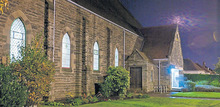Scotland: Revisionism’s Gravitational Pull

Some advocate strongly for staying in denominations which are being sucked into the black hole of contemporary morality. John Stott is cited as someone who would support this today. Others have come to a place much more like that expressed in the quote above – it is time for us to realign for our spiritual health, for the extension of the kingdom and in obedience to the Lord.
The strong gravitational pull of a denomination makes it very hard to leave it. The energy required to escape that hold is so great that few in the end are willing to even try. Fear of loss, the comfort of job security and the possibility of promotion all serve to keep people in place in the face of poor episcopal leadership and destructive false teaching. Obedience to bishops has taken on a new emphasis which results in few church leaders publicly resisting the revisionism of bishops.
Those who stay hope that ‘up from the ashes grow the roses of success’. Some will adopt the view that, so long as they can preach the gospel locally, all will be well. They learn to live with cognitive dissonance. Such church leaders insulate their people from the harshest of revisionist teaching. This has been our tragic experience in Scotland.
How did we get here?
Evangelical leaders in the Scottish Episcopal Church (SEC) have long recognised that they serve in a liberal catholic province. Yet they believed that transformation was possible. For that reason, ordinands were sponsored, churches planted and parish share paid to the diocese. One bishop described the evangelicals as ‘the new establishment’.
All that work was taking place against the background of a well-run campaign to change the doctrine of marriage.
In 2005 the bishops declared that being in a same-sex relationship was no bar to ordination. Some clergy resisted and the Scottish Anglican Network was created to present a united orthodox standpoint. However, the growing number of openly gay clergy in relationships meant that a pressure was building for change.
In 2007 a new marriage liturgy was introduced which included one service which could be used without adaptation for same-sex couples. An evangelical church leader pointed this out. He was laughed off. A senior Scottish bishop is now telling people in the Anglican Communion that Scotland already had an appropriate liturgy in place years before same-sex marriage was introduced. The SEC is exporting the model for other provinces to follow.
Jerusalem
In 2008, the first Global Anglican Future Conference (GAFCON) took place in Jerusalem. One Scot attended and found that it was an encouragement to stand firm.
No-one from Scotland attended GAFCON 2013 because we believed that the bishops were listening and that we had influence. In retrospect this was naive.
2014 brought the ‘Cascade Conversations’ which were facilitated meetings designed to help hear the stories of others. These felt somewhat one-sided, focusing on individual pain and experience, rather than biblical authority. Many evangelicals believe they were not heard and that later their position was misrepresented.
In 2015 the possibility of a change to the marriage canon was introduced. Evangelicals offered a compromise which would have left the canon unchanged, but allowed clergy to depart from the teaching of the church. This compromise was heavily defeated. It became clear where all this was heading. By 2017 it was all over.
New marriage canon
The new marriage canon completely removed the first paragraph which read: ‘The Doctrine of this Church is that Marriage is a physical, spiritual and mystical union of one man and one woman created by their mutual consent of heart, mind and will thereto, and is a holy and lifelong estate instituted of God.’ The new first paragraph has no biblical theology or anthropology of marriage. It merely articulates that there are different understandings of marriage and that no-one can be made to conduct a marriage against their conscience.
This was narrowly passed in the House of Clergy and some suggest that if only a few more orthodox clergy were present it could have been halted. This fails to recognise the unrelenting nature of the campaign. Unless the bishops had stopped it, it would have kept being presented until the battle was won for revisionism.
Three churches vote to leave
The GAFCON movement called Andy Lines to be missionary bishop to Europe following some Scots’ request. Three congregations have voted to leave the Scottish Episcopal Church and we hope that they will be organised under his leadership. We pray that others will have the courage to stand with them.
Evangelicals Now March 2019





